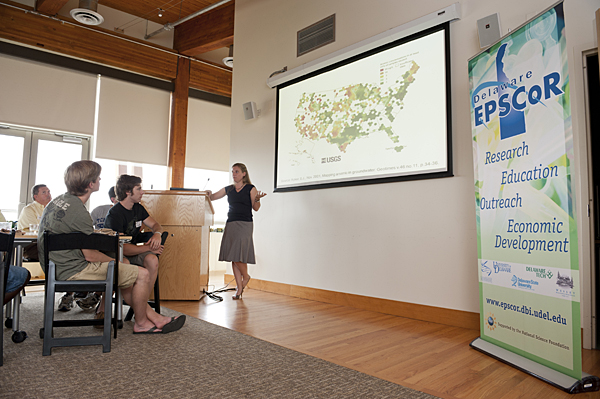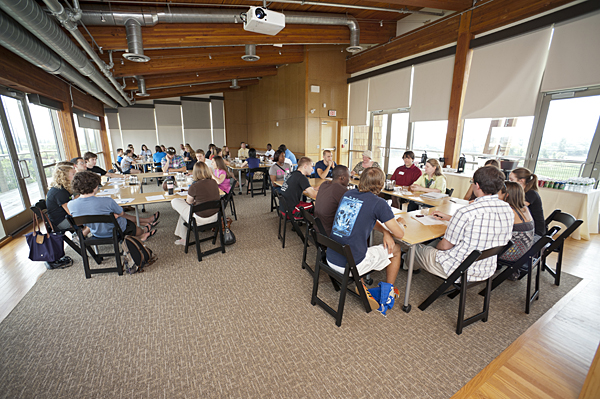Research rules
Discovery learning rules the summer for Delaware EPSCoR research interns
10:37 a.m., July 21, 2011--Thirty-nine undergraduate students from the University of Delaware, Delaware State University, Wesley College and Delaware Technical and Community College are spending the summer immersed in the nitty-gritty of environmental research with the support of the Delaware EPSCoR program.
The Experimental Program to Stimulate Competitive Research (EPSCoR) is funded by the National Science Foundation to help states build strategic research initiatives and institutions. In Delaware, the statewide program focuses on enhancing environmental science, engineering and policy research in support of the state’s goal of achieving a sustainable environment and a prosperous economy.
Research Stories
Chronic wounds
Prof. Heck's legacy
“An important aspect of advancing environmental research and policy in Delaware is ensuring that there is a solid stream of bright young people who are well-prepared to tackle the environmental problems and issues we face with creativity and innovation,” says Jeanette Miller, who directs the EPSCoR internship program.
According to Miller, the participation of a range of institutions in Delaware — from the community college through research universities — in the EPSCoR program is key to developing this “educational pipeline” for students, both those who are certain about what they want to do in their careers and those who may still be “testing the waters.”
This summer marks the eighth year for the EPSCoR undergraduate internship program. The interns are working with faculty mentors at three institutions — not necessarily their home institution — on projects ranging from the nesting success of the female veery (a migratory songbird), to beachgoer responses to offshore wind turbines, to culturing bacteria from soils in the Arctic tundra.
In addition, several students this year are working for the first time with personnel at Delaware state agencies or municipalities on projects that will enhance the state’s ability to maintain the quality of water in its public water supplies, watersheds and bays.
The interns gathered on June 10 at the DuPont Environmental Education Center, an urban nature center on the Wilmington waterfront operated by the Delaware Nature Society, for a retreat designed to introduce them to each other and to the program.
“For most of the students, a summer research internship is an exploratory experience,” Miller says. “It’s a chance to think about whether research is something they want to pursue in the future and how their own skills and interests might fit into that arena. The purpose of the retreat was to present information about various graduate school and career options as well as to help build their communication and networking skills.”
Miller notes that all of the students will be required to present their work, both within their research groups and at undergraduate research symposia sponsored by UD and DSU at the end of the summer. Some interns in the past have even become authors of published scientific papers about their research projects.
Brittany DeBord, a senior environmental engineering major at UD, says that her main objective for the summer is to conduct research that “could lead to a positive impact on the environment.” She is studying communication sensing genes in mineral-degrading microbes with Julie Maresca, assistant professor of civil and environmental engineering at UD. Knowledge of these genes could enable industrial processes such as chemical mining to employ harmless microbes instead of detrimental chemicals.
But DeBord also says she hopes to experience what research is like as “an independent scientist as opposed to a student just repeating a dependable experiment in lab class. I think research will take me out of my comfort zone, and I will find, despite my three years of enthusiastic study, that there is so much more to learn and much more trial and error involved in this kind of learning than what a textbook tends to portray.”
Many interns also experience firsthand the teamwork that occurs among faculty-led research groups in institutional settings, where team members focus on different aspects of a research problem.
“In my research lab, we have formal meetings where the graduate and undergraduate students talk about what we are doing with our research,” says Rahmeek Perry, a senior forensic biology major at DSU who is working with assistant professor of chemistry Cherese Winstead on developing biopolymers from the shells of marine invertebrates such as crabs to encapsulate therapeutic drugs.
“We’re all required to speak for three to five minutes and have to answer questions, so I’m getting a lot of opportunities to practice my communication skills during my EPSCoR experience,” he says.
For more information about the EPSCoR summer internship program, see the Delaware EPSCoR website.
Article by Beth Chajes
Photos by Evan Krape
Video by Meredith Chapman













